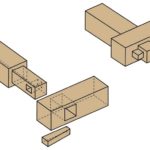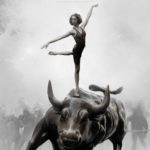
I don’t keep much. Yes, stuff clutters my life but not from way back.
Family things went into diaspora after my father died. My mother wisely refused to become the widow Degelman in our little New England town. She sold the house and left for New York University to begin a new life.
My personal stuff fell prey to gypsy days and a metaphoric compulsion to shed my skin by giving stuff away or throwing it out.
I kept a few things. Chinese pewter candlesticks my grandparents brought back from China before WWII. An oak table, crafted by my father’s Japanese friend, built before I was born. He crafted the table out of tight-grained oak, hand-planed and perfectly proportioned. It has no fasteners, only joinery — the crossed legs mortised into each other, the supporting struts tenoned and pegged. 
The table sits in my office, bearing the scratches, scars, ink stains and water rings of a lifetime. I remember crawling over those struts beneath the table, convinced I was invisible to the world.
I kept three guitars: a Martin D-28 dreadnought, now battered by use, eroded from flatpicking, but lovingly cared for. A Dobro steel guitar, enameled a screaming cobalt blue with a chrome soundpan. I played both guitars on the streets in the 1970s.
My third guitar was built in LA’s Boyle Heights by the Delgado Brothers’ fourth generation of guitar makers.
I was ushered into the Delgados’ fragrant, dusty shop by my friend Hirth, LA’s own Doctor John. A remarkable songwriter and stellar guitarist, Hirth was born in Boyle Heights to a Chicano father, a labor organizer, and a Jewish mother, back when the neighborhood was half Jewish, half Chicano.
In back room of the Delgado Brothers’ shop, Hirth and I played guitars at each other to hear the full-frontal voice of each instrument. Hirth died last year but he visits me in the guitar. He says he enjoys the vibrations of my sofa-bound noodling and tells me jokes while I play.
I’ve also kept my resistance. I’m not a fighter but I’ve resisted forever. As a kid, I avoided playground fisticuffs and barroom punchouts. As a resistor, I cast my share of stones but I didn’t get off on street fighting with cops. They’re big, they’re scared, they can be mean. Besides, they got the guns and you don’t.
Resistance can be more terrifying than exhilarating, but I resisted anyway. I loved resistance and a feared it, but when new and revolting developments threatened my resistance, I held it all the more dearly to my heart.
For example, once upon a time, a revolutionary group called Weatherman splintered off from its parent organization, Students for a Democratic Society. The Weather People declared war against the government of the United States and learned to build bombs. Everyone involved stood at a crossroads.
I understood Weatherman’s motivations, we had all been driven mad by the injustice of racism and the war. But did their hasty declaration of war represent a viable resistance strategy? Or did it signal the birth of an incubator baby in a premature revolution? What was to be done? We discussed the differences arduously but had to choose our crossroads alone.
 Weatherman became the Weather Underground under pressure from women in the movement. I was impressed by the Weather Underground’s ability to destroy malevolent federal property (draft board offices, draft induction centers, FBI and COINTELPRO facilities) but the Weather people never became a revolutionary army. How were we to declare war? We didn’t have a Ho Chi Minh, we had no popular sea to swim in, we didn’t know how to shoot, and we didn’t have guns (thank goodness).
Weatherman became the Weather Underground under pressure from women in the movement. I was impressed by the Weather Underground’s ability to destroy malevolent federal property (draft board offices, draft induction centers, FBI and COINTELPRO facilities) but the Weather people never became a revolutionary army. How were we to declare war? We didn’t have a Ho Chi Minh, we had no popular sea to swim in, we didn’t know how to shoot, and we didn’t have guns (thank goodness).
The ‘we’ became ‘they.’ They made mistakes. They blew up three of their own while building a bomb in a West Greenwich Village townhouse.
Those were dark days but I kept my resistance. Resistance is resilient, not born or smothered. The System will beat, distort, and trivialize any power that threatens it, but for the lucky few who “dare to struggle, dare to win,” resistance can be full of hope as well as darkness.
We recruited our sense of humor, all our intelligence and guile to keep resistance for the future. Rather than selling out, we adjusted our expectations, changed our strategies, and kept resistance alive. It was difficult not to; resistance carries its own momentum.
We developed alternatives to capital consumerism — land-based utopias and food co-ops, free presses and clinics. A broader view of the world began to emerge. Instead of fighting for the here and now, environmentalism and the health of Mother Earth became the focus. The political turned personal as feminism gathered strength. Ethnic studies programs came to fruition on campuses. We hadn’t lost and we hadn’t stopped. We kept our resistance.
The Reagan era was rough. Many of us had come up against The Gipper as California’s governor and could not believe that such a man could be elected President. Then he began busting the unions. Many of us became union organizers to counter the destruction.
Daddy Bush came and went. Those who knew remembered his role in the violent ouster of the socialist President of Chile, Pinochet and the slaughter of his supporters. We kept track of Bush’s Gulf war, later to be amazed that his collusion to protect Saudi oil in Kuwait would be reduced to trivial in comparison to Cheney’s sociopathic Iraq aggression after 9/11. Keeping track of the hubris and raging against the machine seemed the only way to remain sane.
 Occupy Wall Street seemed a promising response to the collapse of the real estate bubble and the banks but, after the good old boys of government dusted off the good old boys in corporate, we knew, with or without the emergence of leadership, this brave resistance movement could not last. No matter, the fight was admirable and has its own OWS survivors.
Occupy Wall Street seemed a promising response to the collapse of the real estate bubble and the banks but, after the good old boys of government dusted off the good old boys in corporate, we knew, with or without the emergence of leadership, this brave resistance movement could not last. No matter, the fight was admirable and has its own OWS survivors.
Now we have a same old new world. Sometimes I think I know too much to entertain any more notions of fundamental change. I know who the presidential candidates are — and aren’t. I know that we do not live in a pre-revolutionary climate, not yet. I know the limits of the Presidency; it does not offer a pulpit for broad social change. We knew this from before. We paid no attention to the elections until Richard Nixon stumbled into the apocalypse. No worry, decades later, the weather, not the Weather Underground will bring fundamental change.
I keep my art. I keep my resistance. My resistance and my art keep each other. I’ve also kept the pewter candlesticks, the oak table, the three guitars and — with luck and meditation — I’ll manage to keep my friend Hirth.
# # #
P.S. Perhaps the poet and playwright Bertolt Brecht describes the fate of resistance best in this poem, “To Those Born Later.” I hope this poem will augment my hasty efforts at describing such a complex and contradictory history.
Find more of my stuff at www.charlesdegelman.org and @CDegelman.
Writer, editor, and educator based in Los Angeles. He's also played a lot of music. Degelman teaches writing at California State University, Los Angeles.
Degelman lives in the hills of Hollywood with his companion on the road of life, four cats, assorted dogs, and a coterie of communard brothers and sisters.




I like your both literal (candlesticks, table, guitars) and metaphorical (resistance) interpretation of the prompt and how the two interweave in your story. I read recently that more boomers now identify themselves as conservative than liberal, which is fully consistent with past generations but surprised me anyway. I had thought that, as a generation, our youthful passion for social and economic justice would last a lifetime, but apparently it takes the kind of careful nurturing that you have given it. More’s the pity.
Thanks, John. I’m gratified that you could sift through my serpentine link between things and values. Certainly the resistance movements that I explore above have been put through the wringer, a contrary indication of how effective resistance can be. The antiwar, civil rights and social/economic justice movements met much opposition, some survivors incline toward curmudgeonry (curmudgeonism?), others became conservatives but look at how the movement has morphed as new generations pick up banners of environmental justice, gender equality, and more.
According to the BORG, resistance is futile…perhaps you’ve noticed. Reading your contribution just now, I think about all you’ve witnessed and the strange times we are in, politically speaking, right now. But you have kept faith with your ideals. Bravo, Chas.
Hi, Betsy. I hope, in this serpentine story entry, I successfully imparted a sense, not of innocence, but of war-weary endurance ;-).
Perhaps the poet and playwright Bertolt Brecht described the fate of resistance best in this poem, “To Those Born Later” http://www.ronnowpoetry.com/contents/brecht/ToThoseBorn.html
I think Brecht is a better poet than a playwright and the last stanza of this poem will, I hope augment my efforts at describing such a complex and contradictory history.
As always the quality of your writing draws me in. It brought up the following memories, and I apologize if I have gone on too long. My experiences with the Weathermen did not leave me with hope or particularly good memories.
Your story brought up memories of a protest by then boyfriend and I attended in Chicago, the year after the election. We rode on a bus from Manhattan, with a group of revolutionaries. Unfortunately for me, I was not buying what the group I met was selling. They didn’t have guns, you are right, but they did have voices and several ganged up on me to convince me to agree with them. They eventually lost me when they told be that” it was okay to kill policemen because policemen were pigs, not humans.” Another young lady(one that was eventually jailed for some years after she was found hiding out in Oregon leading an apparently normal family life)wanted to sleep with my boyfriend. I got a lecture on that as well.
She was later freed. I don’t think of them as heroic revolutionaries, in fact their behavior at the protest was very scary. I later had empathy for the young lady whose father was a newspaper giant and who claimed to have been brainwashed. I felt that was a real possibility under pressure, and that these people were becoming what they hated.
There was a young oriental man who ran with Eric and me and later wrote a book about the group and the protest. We got a mention on some page.
Eric was accused of being a leader(this was his first activity with the group and he was not a leader) He ended up sick in an awful Chicago jail, the FBI followed us around for years and made it very hard for him to keep a job.
There was a run down Chicago’s Miracle Mile and a lot of broken glass.
Those were Days of Rage 1969, I’m guessing, Rosie. A lot of pissed-off kids ran through the streets of a working-class neighborhood, breaking mom & pop store windows and workers’ windshields. I hope I did not imply that I thought Weather Underground had the answers. My comment about ‘dark times’ was directed at the splintering of SDS by Weatherman. I walked away from those crossroads. Weather man did not, and destroyed all the hard work done by Students for A Democratic Society. I weave the painful tale of the Weather Underground into my novel, Gates of Eden. Nothing is simple, especially resistance.
Actually, this is a better translation of Brecht’s poem! http://macaulay.cuny.edu/eportfolios/smonte10/files/2010/08/Brecht-Born-Later.pdf
John,
I am a big fan of Bertolt Brecht, the poem was exactly true Then and now. I had been a distant supporter of the SDS(Liked them but had not participated directly in their actions) When the group splintered, I had sympathy for their frustrations, but still didn’t support the methodology the new group moved towards. I really respected the Black Panthers, although I was not there either. Thanks for being understanding about my comment. I think these days are challenging as well, politically.
Hey, Rosie… Weird, I thought I had responded to your above comment but apparently had not. Well, here I am.
Yeah, that poem was written in 1940, long after Hitler had wormed his way into power. Brecht was referring the struggles in Weimar Germany before between socialists, social democrats, who were splitting over what was best strategy: reform or revolution. Sounds familiar, yes.
Certainly the same happened between factions of the New Left. in the 1960s.
In Germany, the split in the left meant that industrial Germany was not able to join the new Soviet Russia. Imagine if they had joined each other instread of fragmenting. But then, there were consequences of our split, too.
I loved hearing about your three guitars. The scene with your friend Hirth at the Delgado Brothers’ shop must have been amazing. Do you still play much, or do you limit it to “sofa-bound noodling”? (I know, I’m focusing on the music instead of the politics, but both are important.)
Thanks, Suzy. I do treasure those three guitars and my lovable string bass. There are a couple of others, including a Yamaha knock off of a Gibson Les Paul, one of the iconic electric guitars of our world. My friend Hirth had his real Les Paul stolen as he unloaded his guitars after a gig one night in Boyle Heights. I lent him my Yamaha to gig with, and when he returned it, he had done a complete makeover on my guitar, making it better than ever!
The politics become a little overwhelming in this retrospect so I appreciated your focus on the music instead of telling me to get off my soapbox! I look forward to reading your next piece.